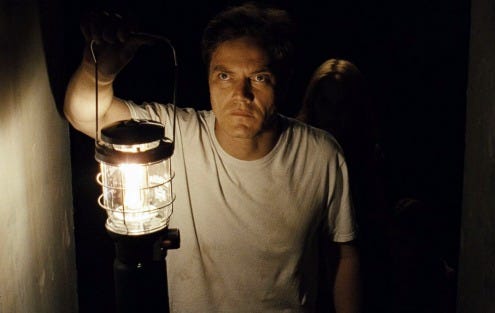Take Shelter

Dark portents are rising, but only one man can see them. "Take Shelter" is a story of foreboding and madness as the sky literally seems to close around Curtis, an average blue-collar family man from Ohio.
Clouds roil in over the fields in strange, disturbing twists and formations. Birds fly in vexing patterns with no rhyme or reason, as if they're trying to form their own organic cyclone. When things really get bad, Curtis sees indistinct human shapes through his windows, pawing at him and his family.
The fact that these visions happen both in Curtis' dreams and his waking life make them even more troubling. This is the story of a man who comes not to trust his own mind, and how losing that groundedness of mental integrity causes him to become unstuck from his wife, child, job and community.
Curtis is played by character actor Michael Shannon — known for twitchy supporting roles in mainstream films, including his Oscar-nominated turn as a mentally fractured man in "Revolutionary Road."
There's something about Shannon's looming height and malleable features that makes him a natural fit for playing tortured souls. He tends to keep a straight face that is always on the verge of plunging into a well of emotion. I cannot countenance the notion of a Michael Shannon romantic comedy.
It's an entirely new experience to see him taking the sort of character who would normally populate the background of a star vehicle and giving him his own movie. Shannon is equal to the task, drawing a portrait of a man who is self-aware about what is happening to him but cannot turn away from the visions.
As time goes on and the dreams grow worse — threatening his daughter, Hannah (Tova Stewart) — Curtis takes action. He puts his beloved dog, which he dreamed tore his arm apart, in a pen.
Curtis avoids self-denial about his predicament. He checks out books on mental illness from the library and sees his doctor for some sleeping pills. His mother (Kathy Baker) was taken away from him by schizophrenia when she was the same age Curtis is now, so it's clear this descent into mental illness is something he has long feared and guarded against.
Things really grow strange when he decides to expand the old storm shelter in his backyard into a veritable underground fortress, borrowing money they don't have from the bank to do it.
It's notable that in none of Curtis' visions does his wife Samantha appear. That is, until ...
Samantha is played by Jessica Chastain, who's had a major career birth over the last year in "The Debt," "The Tree of Life," "The Help" and other films. She plays Samantha as more than just the good-wife role — as a loving woman who is there for her husband and wants to do everything to help him — but makes it clear there are lines that cannot be crossed. At one point, she insists they go to a Lions Club oyster fry dinner simply because they need to do something normal.
Writer/director Jeff Nichols paints an authentic portrait of Midwest normalcy disrupted by extraordinary circumstances. He wisely puts his focus and his camera tightly on his actors and keeps it there.
At just over two hours, the movie lingers a little too much here and there and suffers bouts of predictability. The fact that Hannah is deaf and needs cochlear implants paid for by Curtis' health insurance sets up a countdown for inevitable problems on the job.
"Take Shelter" is sometimes predictable — that is until the very end, which suggests things that seem to come out of left field until you recall hints that have been dropped along the way. I think this ending weakens the film, which is less concerned with the twists and turns of plot than how a man deals with the whole world crashing in on him, exposing his weaknesses.
4 Yaps



